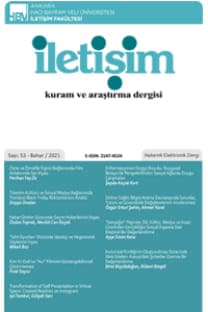Globalleşme ve Ulus-Devlet
Globalleşme, Global Toplum, Globalcilik, Ulus-Devlet
Globalization and Nation-State
Globalization, Global Society, Globalism, Nation-State,
___
- Aslanoğlu, Rana A. (1998). Kent, Kimlik ve Globalleşme, Bursa: Asa Kitabevi.
- Ayman Güler, Birgül (1996). Yeni Sağ ve Devletin Değişimi: Yapısal Uyarlama Politikaları, Ankara: TODAİE Yayını.
- Bauman, Zygmunt (1999). Globalleşme, İstanbul: Ayrıntı Yayınları.
- Bauman, Zygmunt (2001). “Wars of the Globalization Era”, European Journal of Social Theory, 4(1): 11-28.
- Beck, Ulrich (1999). “Democracy Beyond the Nation-State: A Cosmopolitical Manifesto”, Dissent, 46(4): 53-55.
- Beck, Ulrich (2000). “The Cosmopolitan Perspective: Sociology of the Second Age Modernity”, British Journal of Sociology, 51(1), s. 79-105.
- Castells, Manuel (2000). “Toward a Sociology of the Network Society”, Contemporary Sociology, 29(5), s. 693-699.
- Cohen, Edward S. (2001). “Globalization and the Boundries of the State: A Framework for Analysing the Changing Practice of Sovereignty”, Governance, 14(1), s. 75-97.
- Çıtak, Zana (2000). “A Critical Analysis of Two Approaches to Globalization and Governance”, ODTÜ Gelişme Dergisi, 27(1-2), s. 47-69.
- Downes, Bryan T. (1998). “The Role of the Governments in 21st Century Governance: A Concluding Essay, The Social Science Journal, 35(4), s. 589-599.
- Falk, Richard (2001). Yırtıcı Globalleşme: Bir Eleştiri, (Çev. A. Çaksu), İstanbul: Küre Yayınları.
- Farazmand, Ali (1999). “Globalization and Public Administration”, Public Administration Review, 59(6), s. 509-522.
- Gane, Nicholas (2001). “Chasing the ‘Runaway World’: The Politics of Recent Globalization Theory”, Acta Sociologica, 44(1), s. 81-89.
- Giddens, Anthony (1994). Modernliğin Sonuçları, (Çev. E. Kuşdil), İstanbul: Ayrıntı Yayınları.
- Giddens, Anthony (2000). Elimizden Kaçıp Giden Dünya, (Çev. O. Akınhay), İstanbul: Alfa Yayınları.
- Goodhart, Michael (2001). “Democracy, Globalization, and the Problem of the State”, Polity, 33(4), s. 527-546.
- Held, David, Anthony McGrew, David Goldblatt ve Jonathan Perraton (1999). “Globalization”, Global Governance, 5(4), s. 483-496.
- Held, David (2000). “Regulating Globalization? The Reinvention of Politics”, International Sociology, 15(2), s. 394-408.
- Hirst, Paul ve Grahame Thompson (1998). Globalleşme Sorgulanıyor, (Çev. Ç. Erdem ve E. Yücel), Ankara: Dost Kitabevi.
- Keyman, E. Fuat ve A. Yaşar Sarıbay (1998). “Globalleşme, Siyaset ve Toplumsal Yaşam”, E. F. Keyman ve A. Y. Sarıbay, (Ed.) Globalleşme, Sivil Toplum ve İslam, Ankara: Vadi Yayınları.
- Keyman, E. Fuat ve A. Yaşar Sarıbay (2000). Global Yerel Eksende Türkiye, İstanbul: Alfa Yayınları.
- Keyman, E. Fuat (2002). “Kapitalizm-Oryantalizm Ekseninde Globalleşmeyi Anlamak: 11 Eylül, Modernite, Kalkınma ve Öteki Sorunsalı”, Doğu Batı, (18), s. 27-53.
- Maclean, Jason (2000). “Globalization and the Failure of the Sociological Imagination: A Review Essay”, Critical Sociology, 26(3), s. 329-349.
- Mahçupyan, Etyen (1996). Osmanlı’dan Postmoderniteye, İstanbul: Patika Yayınları.
- Meyer, John W. (2000). “Globalization: Sources and Effects on National States and Societies”, International Sociology, 15(2), s. 233-248.
- Olma, Sebastian (2001). “Globalization, the Pudding and the Question of Power”, Theory Culture and Society, 18(4), s. 111-122.
- Robertson, Roland (1999). Küreselleşme: Toplum Kuramı ve Küresel Kültür, (Çev. Ü. H. Yolsal), Ankara: Bilim ve Sanat Yayınları.
- Robertson, Roland ve Habib Haque Khonder (1998). “Discourses of Globalization”, International Sociology, 13(1), s. 25-40.
- Robinson, Willam I. (1998). “Beyond Nation-State Paradigms: Globalization, Sociology and the Challenge of Transnational Studies”, Sociological Forum, 13(4), s. 561-594.
- Robinson, Willam I. (2001). “Social Theory and Globalization: The Rise of a Transnational State”, Theory and Society, (30), s. 157-200.
- Sarıbay, Ali Yaşar (1998). “Globalleşme, Postmodern Uluslaşma ve İslam”, E. F. Keyman ve A. Y. Sarıbay (Ed.), Globalleşme, Sivil Toplum ve İslam, Ankara: Vadi Yayınları.
- Therborn, Göran (2000). “Globalization: Dimensions, Historical Waves, Regional Effects, Normative Governance”, International Society, 15(2), s. 151-179.
- Therborn, Göran (2001). “Into the 21st Century: The New Parameters of Global Politics”, New Left Review, (10), s. 87-110.
- Wallerstein, Immanuel (2000). “Globalization or the Age of Transition?: A Long Term View of the Trajectory of the World-System”, International Sociology, 15(2), s. 249-265.
- Yayın Aralığı: 3
- Başlangıç: 1983
- Yayıncı: Ankara Hacı Bayram Veli Üniversitesi İletişim Fakültesi
Dijital Çağda Korku ve Keyfin Yeni Tanımı: FoMO ve JoMO
Ayşe Aslı SEZGİN, Zaliha İnci KARABACAK
İstanbul’daki Mültecilerin Entegrasyon Sürecinde Yeni Medyanın Varlığı
Fırat TUFAN, Jan KRZYSZTOF OLENDZKİ,
Kamu Diplomasisi ve Ulus Markalaşması: Bir Elmanın İki Yarısı Mı?
Kamu Çalışanlarının Teknolojinin Gözetim İşlevine Bakışı*
Kopenhag Okulu’nun Güvenlikleştirme Teorisi Bağlamında Güvenlik-Medya İlişkisi
Halkevi Dergilerinde Haber ve Reklamlar: Taşan Dergisi Örneği
Nurettin GÜZ, Behlül Burak DUMLU, Mert Güngör TUTAK
Yapılanma, Çözülme, Belirsizlik: Gazetecilik Pratikleri ve Basın İş Hukuku
